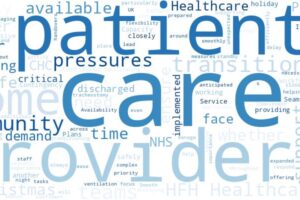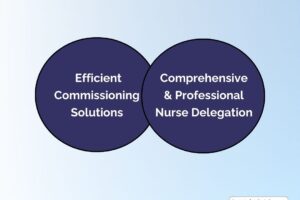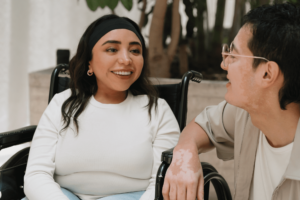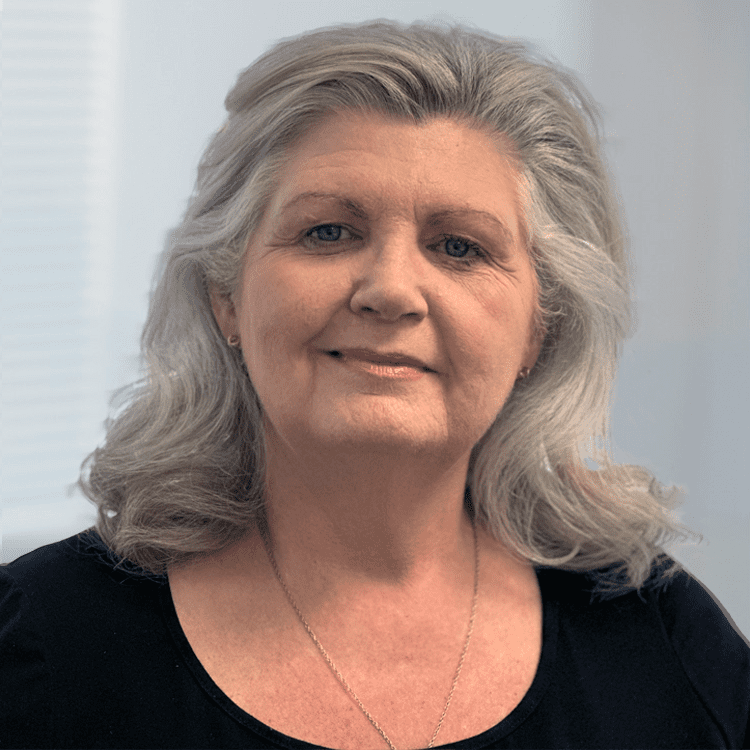
This post will help those with motor neuron disease and provide information about how they can manage their condition and well-being.
For those living with motor neurone diseases (MND), daily life can be a challenge, particularly as the condition progresses. But there are many ways in which a person can prolong their independence and improve both their daily living and quality of life. In this blog we will outline some of the specialist equipment available to those with MND, along with helpful exercise they can do to manage their condition and improve their overall wellbeing.
Understanding MND
Motor neurone disease is a progressive condition that affects the nerves known as motor neurones, that are found in the brain and spinal cord. Over time the motor neurones stop sending messages to the muscles, causing them to become weak, stiff and degenerate.
The condition affects a person’s ability to swallow, speak, walk and breathe and therefore specialist complex care is required for those in the later stages of the disease. Unfortunately MND is a degenerative disease for which there is no cure, however through with high quality and compassionate care, people with the condition can continue living full lives.
If you would like to find out more about MND then read our blog on common questions about MND.
Equipment for MND patients
There is a wide range of specialist equipment for MND patients that can help improve the quality of their daily life whilst living with the condition, helping with:
- Completing daily tasks
- Retaining independence around the home
- Personal care
- Eating and drinking
- Communication
- Accessing stairs
- Staying a part of the community
- Driving
Mobility aids
Motor neurone disease causes a person’s muscle to become weak and eventually stop working altogether, therefore people with MND will usually require mobility aids to help them get around, particularly as the condition progresses.
Crutches, walking sticks and frames can help with balance and movement in the early stages of the disease. While a power-assisted wheelchair and hoists can be used in the later stages of MND for those who struggle to move unassisted.
Communication aids
As speaking and movement becomes more difficult, a person can use a number of different aids to help them communicate with their family, friends and carers. This can be in the form of communication cards or assistive technology, such as eye gaze, which allows a person to control a tablet through only their eye movements.
Ventilation equipment to support breathing
As a person’s condition worsens they may need assistance in enabling them to breathe and will require equipment such as a ventilation machine to increase the flow of air and oxygen into the lungs.
At HFH we provide expert nurse-led airway and respiratory care for clients with MND and other complex conditions that require breathing support, including:
- Tracheostomy care
- Invasive and non-invasive ventilation
- Airway suctioning
- Cough assist
- Oxygen therapy and monitoring
Adapted furniture
Adjustable beds and life chairs can be installed into the home to ensure a person can navigate their house with ease and feel safe while doing so.
Assistive devices
This includes:
- Adaptive utensils with larger grips or specialised shapes to aid in eating.
- Dressing aids to assist with putting on and taking off clothes, such as button hooks or zipper pulls.
- Reacher or grabber to help with reaching items that are high or low around the home.
- Smart devices that control items around the home, from lighting to the TV.
- Adaptive controls for a vehicle to enable a person to continue driving.
Safety devices
Safety equipment helps a person feel secure whilst living at home, especially if they are alone. Hand and bed rails help to ensure a person is kept safe, while personal alarm devices can be used to contact emergency services if they have suffered a fall or injury.
You can find out more information on equipment for MND patients with this helpful guide from the Motor Neurone Disease Association.
Exercises for MND patients
Gentle exercise can be hugely beneficial for people with MND in helping to maintain their flexibility, improve muscle weakness and contribute to their overall wellbeing.
People with MND struggle with tiredness and fatigue, therefore it is important to perform exercises that are not too strenuous on the body.
Below are some of the different types of appropriate exercises for MND patients. These exercises will most commonly be done under the guidance and supervision of a physiotherapist as part of a person’s care, but can also be done independently to improve a person’s condition.
- Range of motion exercises can help maintain flexibility and prevent joint stiffness without over-training the body, such as grip and wrist exercises.
- Strength exercises are beneficial for maintaining muscle strength and can be adapted to the individual’s abilities.
- Seated exercises can help improve flexibility and muscle strength while also being low impact and accessible for those who may be unable to perform standing exercise due to their condition.
- Balance exercises, such as simple activities like weight shifting, can help a person maintain their stability and feel more confident when moving around independently at home.
- Swimming and hydrotherapy can help improve strength and mobility without putting pressure on the joints.
- Breathing exercises can help improve respiratory function. Techniques such as deep diaphragmatic breathing can be beneficial for those with MND.
Our complex care for clients with MND
At HFH we provide comprehensive in-home care for clients with MND and many other complex conditions. Most often we work with clients at the later stages of the disease, where highly specialist care is required for them to continue with their daily life. This can include a number of complex care services, from helping with the breathing, feeding and general personal care so they can live safely at home where they feel most comfortable.
We understand that living with MND can be a challenging journey, especially as the condition progresses, but we are here to support our clients every step of the way. We take a holistic approach to our clients’ care and help them to adapt to the changes that their condition brings, whilst maintaining their sense of self and independence.
If you would like to find out more about our complex care services including for those with Motor Neuron Disease then contact our friendly team now.









1 Comment
Katherine Bhana
March 8, 2024 at 4:48 pmALS is a cruel disease. My mum is 83 and had great difficulty speaking and swallowing much of anything. Food was getting trapped in her throat and blocking her air way was happening more often. she battled for each breath. The riluzole did very little to help her. The medical team did even less. Her decline was rapid and devastating. The psychological support from the medical centre was non-existent and if it were not for the sensitive care and attention of our primary physician, there she would have died. There has been little if any progress in finding a cure or reliable treatment. Acupuncture eased her anxiety a bit. this year our primary physician started her on Natural Herbs Centre ALS/MND Ayurvedic treatment, 6 months into treatment she improved dramatically. It has been a complete turnaround with her speech, she no longer needs the feeding tube to feed, the treatment is a miracle. She recovered significantly!